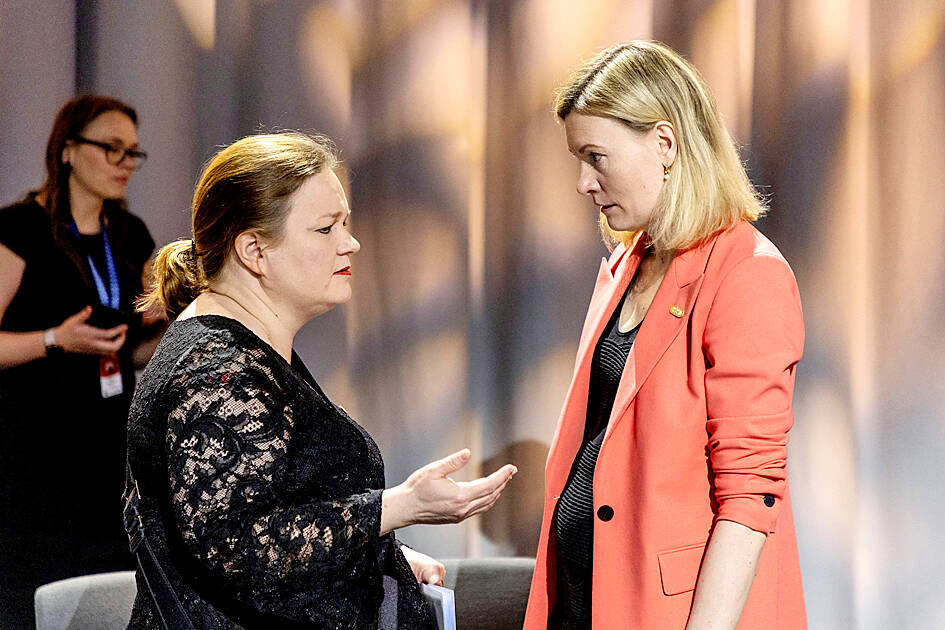Taiwan should be included in world health matters, Estonia said in a statement on Tuesday at the World Health Assembly (WHA) in Geneva, Switzerland.
In her address on the third day of the 76th WHA, the WHO’s annual decisionmaking forum, Estonian Minister of Health Riina Sikkut said that her country believed nations should “facilitate inclusion and meaningful participation of all partners, including Taiwan, and this would benefit global health.”
Estonia was one of 10 countries to support Taiwan’s inclusion at the session, with the others being Lithuania, Luxembourg and Germany, which have no formal diplomatic relations with the nation, and diplomatic allies Haiti, the Marshall Islands, Nauru, Paraguay, Saint Lucia, and Saint Vincent and the Grenadines.

Photo: Reuters
Marshall Islands Minister of Health Joe Bejang made a personal plea to WHO Director-General Tedros Adhanom Ghebreyesus.
“We should stop the politics, stop the neglect, for we are all human beings and we should be focusing on achieving the highest possible standard of health for all people,” Bejang said. “Let Taiwan help.”
The support came a day after the WHA rejected a proposal from Taiwan’s diplomatic allies, including Belize, Nauru, the Kingdom of Eswatini and the Marshall Islands, to put the issue of Taiwan being granted observer status on the WHA’s agenda.
China objected to the proposal.
Earlier on Tuesday, the Ministry of Foreign Affairs held a separate Global Collaboration and Training Framework forum in Geneva to highlight the importance of Taiwan’s involvement in the WHO.
Minister of Health and Welfare Hsueh Jui-yuan (薛瑞元) said that no country is safe from pandemics that are without historical precedent, and the Preparedness and Resilience for Emerging Threats initiative, touted by the WHO, was only implemented after the COVID-19 pandemic began.
Loyce Pace, assistant secretary at the US Department of Health and Human Services’ Office of Global Affairs, said that the world should learn from the COVID-19 pandemic.
Health monitoring and data systems, as well as innovation in pandemic prevention, are important to prepare before the next great pandemic, Pace said.
The US affirms the importance of bilateral, regional and other collaborations that the US conducted with Taiwan, including through the Global Collaboration and Training Framework, Pace said.
Taipei Economic and Cultural Office in Geneva Director-General Nicole Su (蘇瑩君) said that the forum highlighted what Taiwan could bring to the table given its strengths in the medical sector to solve global problems and improve multilateral partnerships.

MAKING WAVES: China’s maritime militia could become a nontraditional threat in war, clogging up shipping lanes to prevent US or Japanese intervention, a report said About 1,900 Chinese ships flying flags of convenience and fishing vessels that participated in China’s military exercises around Taiwan last month and in January last year have been listed for monitoring, Coast Guard Administration (CGA) Deputy Director-General Hsieh Ching-chin (謝慶欽) said yesterday. Following amendments to the Commercial Port Act (商港法) and the Law of Ships (船舶法) last month, the CGA can designate possible berthing areas or deny ports of call for vessels suspected of loitering around areas where undersea cables can be accessed, Oceans Affairs Council Minister Kuan Bi-ling (管碧玲) said. The list of suspected ships, originally 300, had risen to about

DAREDEVIL: Honnold said it had always been a dream of his to climb Taipei 101, while a Netflix producer said the skyscraper was ‘a real icon of this country’ US climber Alex Honnold yesterday took on Taiwan’s tallest building, becoming the first person to scale Taipei 101 without a rope, harness or safety net. Hundreds of spectators gathered at the base of the 101-story skyscraper to watch Honnold, 40, embark on his daredevil feat, which was also broadcast live on Netflix. Dressed in a red T-shirt and yellow custom-made climbing shoes, Honnold swiftly moved up the southeast face of the glass and steel building. At one point, he stepped onto a platform midway up to wave down at fans and onlookers who were taking photos. People watching from inside

Japan’s strategic alliance with the US would collapse if Tokyo were to turn away from a conflict in Taiwan, Japanese Prime Minister Sanae Takaichi said yesterday, but distanced herself from previous comments that suggested a possible military response in such an event. Takaichi expressed her latest views on a nationally broadcast TV program late on Monday, where an opposition party leader criticized her for igniting tensions with China with the earlier remarks. Ties between Japan and China have sunk to the worst level in years after Takaichi said in November that a hypothetical Chinese attack on Taiwan could bring about a Japanese

STREAMLINED: The dedicated funding would allow the US to transfer equipment to Taiwan when needed and order upgraded replacements for stockpiles, a source said The US House of Representatives on Thursday passed a defense appropriations bill totaling US$838.7 billion, of which US$1 billion is to be allocated to reinforcing security cooperation with Taiwan and US$150 million to replace defense articles provided to the nation. These are part of the Consolidated Appropriation Act, which the US House yesterday passed with 341 votes in favor and 88 against. The act must be passed by the US Senate before Friday next week to avoid another government shutdown. The US House Committee on Appropriations on Monday unveiled the act, saying that it allocates US$1 billion for the Taiwan Security Cooperation Initiative